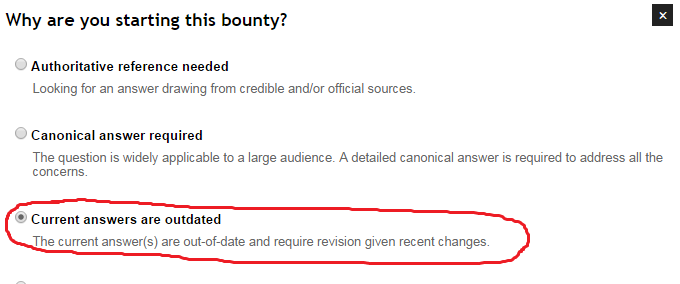Background
There is a meta discussion going on, on How to deal with hugely upvoted, bad answers?. And as an answer, I wrote:
You can downvote, comment, and provide a better answer, of course. But...
If the obsolete answer is really old, it is most probable that your comment/answer will be drowned for a long time. I think this is where we have to take a leaf out of Wikipedia's book.
When an article in Wikipedia has obsolete facts, and if Wikipedians notice this, they can let others know it by adding
{{Update|inaccurate=y}}to the page. The result is this:
This is essentially equivalent to "This answer is obsolete" comment on Stack Overflow. But note that, unlike in Stack Overflow, Wikipedia does not naturally drown that flag. It is displayed on the very top of the page. This has several advantages:
- Wikipedia users know up-front that the information in the article might be obsolete. They do not have to use that information in order to realize that it is obsolete.
- If they visit the article, without any inspection, Wikipedia editors immediately know that the article should be fixed. So the correction process is faster.
I think we should have something similar on Stack Overflow. A flag for obsolescence: a flag not for moderators, but for the community. And enough flags (3? 5?) should display a message about the answer.
And this has gained popularity (currently +51/-1), so I am converting the idea to a feature request.
Feature Request
Introduce a way to vote an answer for obsolescence.
- This privilege should only be granted to users above certain reputation. (Proposing 200+ reputation, aka avid users).
- The vote should read something like: "This answer is obsolete: This answer may contain obsolete, out of date information. Or it needs to be updated considering recent software or standard updates."
Voters must provide a clear description about why she thinks the answer to be obsolete.

After voting is done, reason should appear as a comment under the answer.
Rationale:
- Poster of the answer is notified automatically.
- It will be useful for other people who take time to read the comments.

If an answer accumulates a certain number of obsolete votes (proposing 3 votes), a message should be displayed above the answer for the attention of community. "This answer may contain out-of-date information. Please validate this answer and consider providing an answer with recent information."
Rationale:
- Future visitors know up-front of the risk of using the information on the answer.
- Community can know that the answer is obsolete without inspecting it.
- People are hesitant to edit someone else's answer. This message will help lower the mental barrier.

- After this message, once an edit is made, the obsolete votes are cleared. If the edit does not make the answer up to date, it should be rejected on review, and votes for obsolescence should be restored.
Other things
This is intended to work on well formed, highly upvoted, but old and obsolete answers. As we have seen, downvotes are too slow to drown the obsolete answers.
Or we can use this for answers that does not include solutions for standards introduced afterwards (e.g. Answer posted in the time of HTML4 may have a better way to do the same thing with HTML5). It is to improve the wiki aspect of Stack Overflow, not to be used as a quality control tool on new answers.
If this ever gets approved:
- The messages described in the feature request can (and I think should) be changed to more elegant texts.
- Mentioned reputation levels can be discussed.

